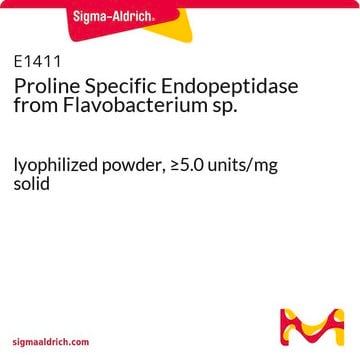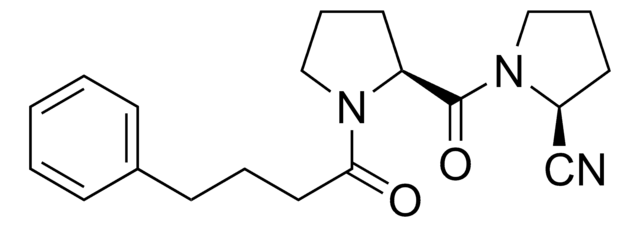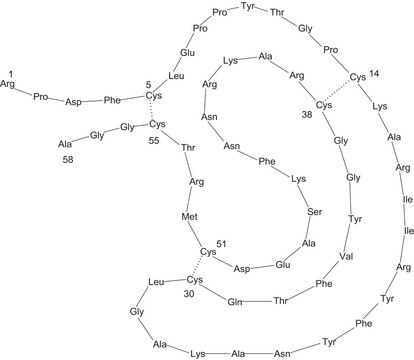537011
Prolyl Endopeptidase Inhibitor II
The Prolyl Endopeptidase Inhibitor II, also referenced under CAS 108708-25-4, controls the biological activity of Prolyl Endopeptidase. This small molecule/inhibitor is primarily used for Protease Inhibitors applications.
Sinônimo(s):
Prolyl Endopeptidase Inhibitor II, Z-PP-CHO
Faça loginpara ver os preços organizacionais e de contrato
About This Item
Fórmula empírica (Notação de Hill):
C18H22N2O4
Número CAS:
Peso molecular:
330.38
Código UNSPSC:
12352200
Produtos recomendados
Nível de qualidade
Ensaio
≥97% (HPLC)
forma
oil
fabricante/nome comercial
Calbiochem®
condição de armazenamento
OK to freeze
protect from light
cor
colorless to off-white
solubilidade
DMSO: 10 mg/mL
DMF: soluble
ethyl acetate: soluble
Condições de expedição
ambient
temperatura de armazenamento
−20°C
Descrição geral
A cell-permeable dipeptide aldehyde that acts as a specific, potent, slow and tight-binding transition state analog inhibitor of prolyl endopeptidase (Ki = 350 pM and 500 pM for mouse brain and human brain prolyl endopeptidase, respectively). Reported to form a hemiacetal with the active-site serine.
A cell-permeable dipeptide aldehyde that acts as a specific, potent, slow, and tight-binding transition state analog inhibitor of prolyl endopeptidase (Ki = 350 pM and 500 pM for mouse brain and human brain, respectively). Reported to form a hemiacetal with the active site serine of the enzyme.
Ações bioquímicas/fisiológicas
Cell permeable: yes
Primary Target
Mouse brain prolylendooeotidase
Mouse brain prolylendooeotidase
Product does not compete with ATP.
Reversible: no
Target Ki: 350 pM and 500 pM for mouse brain and human brain prolyl endopeptidase, respectively
Embalagem
Packaged under inert gas
Advertência
Toxicity: Standard Handling (A)
Sequência
Z-Pro-Pro-CHO
Reconstituição
Following reconstitution, aliquot and freeze (-20°C). Stock solutions are stable for up to 3 months at -20°C.
Outras notas
Fülöp, V., et al. 1998. Cell94, 161.
Kahyaoglu, A., et al. 1997. Biochem. J.322, 839.
Bakker, A.V., et al. 1990. Biochem. J.271, 559.
Wilk, S., and Orlowski, M. 1983. J. Neurochem.41, 69.
Kahyaoglu, A., et al. 1997. Biochem. J.322, 839.
Bakker, A.V., et al. 1990. Biochem. J.271, 559.
Wilk, S., and Orlowski, M. 1983. J. Neurochem.41, 69.
Informações legais
CALBIOCHEM is a registered trademark of Merck KGaA, Darmstadt, Germany
Código de classe de armazenamento
10 - Combustible liquids
Classe de risco de água (WGK)
WGK 1
Ponto de fulgor (°F)
Not applicable
Ponto de fulgor (°C)
Not applicable
Certificados de análise (COA)
Busque Certificados de análise (COA) digitando o Número do Lote do produto. Os números de lote e remessa podem ser encontrados no rótulo de um produto após a palavra “Lot” ou “Batch”.
Já possui este produto?
Encontre a documentação dos produtos que você adquiriu recentemente na biblioteca de documentos.
Zehavit Goldberg et al.
International journal of molecular sciences, 23(2) (2022-01-22)
The aim of this study was to characterize the distribution of the thrombin receptor, protease activated receptor 1 (PAR1), in the neuroretina. Neuroretina samples of wild-type C57BL/6J and PAR1-/- mice were processed for indirect immunofluorescence and Western blot analysis. Reverse
Chenxi Zhao et al.
Journal of neuroinflammation, 19(1), 189-189 (2022-07-17)
Nafamostat mesylate (nafamostat, NM) is an FDA-approved serine protease inhibitor that exerts anti-neuroinflammation and neuroprotective effects following rat spinal cord injury (SCI). However, clinical translation of nafamostat has been limited by an unclear administration time window and mechanism of action. Time
Valery Golderman et al.
Biomedicines, 10(6) (2022-06-25)
Thrombin is present in peripheral nerves and is involved in the pathogenesis of neuropathy. We evaluated thrombin activity in skin punch biopsies taken from the paws of male mice and rats and from the legs of patients with suspected small-fiber
Chenxi Zhao et al.
Neural regeneration research, 19(2), 434-439 (2023-07-25)
Argatroban is a synthetic thrombin inhibitor approved by U.S. Food and Drug Administration for the treatment of thrombosis. However, whether it plays a role in the repair of spinal cord injury is unknown. In this study, we established a rat
Mouhannad Malek et al.
Nature communications, 12(1), 2673-2673 (2021-05-13)
Vesicular traffic and membrane contact sites between organelles enable the exchange of proteins, lipids, and metabolites. Recruitment of tethers to contact sites between the endoplasmic reticulum (ER) and the plasma membrane is often triggered by calcium. Here we reveal a
Nossa equipe de cientistas tem experiência em todas as áreas de pesquisa, incluindo Life Sciences, ciência de materiais, síntese química, cromatografia, química analítica e muitas outras.
Entre em contato com a assistência técnica






